In the heart of Silicon Valley, Y Combinator (YC) has been quietly revolutionizing how water startups approach innovation and scale. Beyond the buzzwords and pitch decks, YC has become a crucible where water entrepreneurs transform groundbreaking ideas into market-ready solutions. With climate change intensifying global water challenges, YC’s unique blend of mentorship, capital, and networking has emerged as a powerful catalyst for water technology ventures. Their portfolio now spans breakthrough solutions in water treatment, smart infrastructure, and resource recovery – demonstrating that water innovation can deliver both environmental impact and venture-scale returns.
Y Combinator is part of my Ultimate Water Investor Database, check it out!
Investor Name: Y Combinator
Investor Type: VC
Latest Fund Size: $2000 Million
Dry Powder Available: Yes
Typical Ticket Size: $250k – $1M
Investment Themes: Water Treatment & Purification, Digital Water / Analytics, Water Efficiency & Reuse
Investment History: $18441666.67 spent over 6 deals
Often Invests Along: Fifty Years, Founders Fund, Refactor Capital
Already Invested In: Biobot Analytics, Solugen Inc., Waterplan
Leads or Follows: Follow
Board Seat Appetite: Rare
Key People: Garry Tan, Michael Seibel, Jared Friedman, Dalton Caldwell
The YC Water Thesis: Why Silicon Valley Bets on Blue
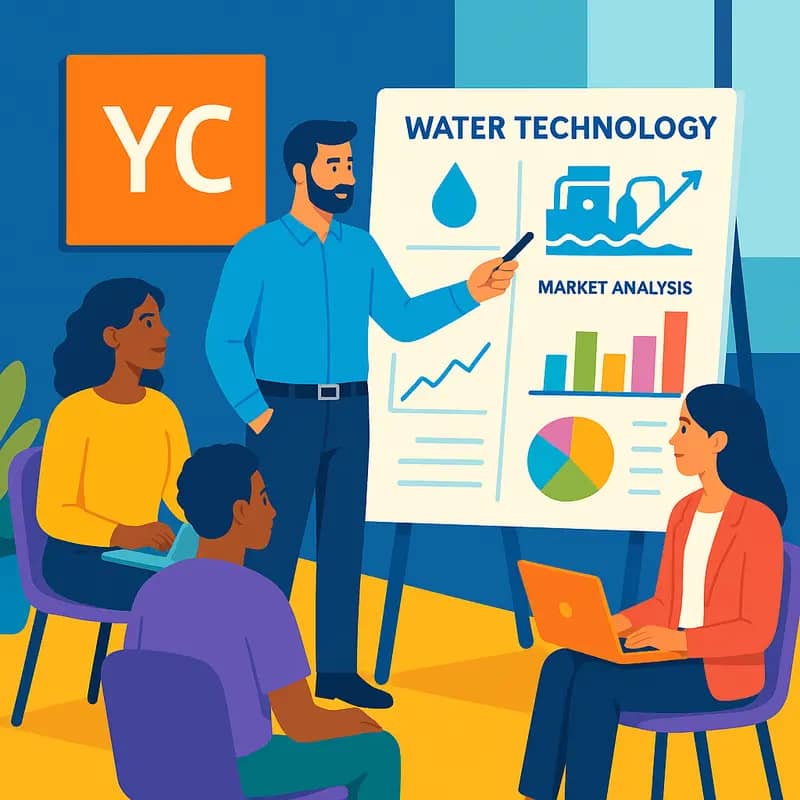
Y Combinator’s strategic pivot toward water technology startups signals a fundamental shift in Silicon Valley’s investment landscape. The accelerator’s water thesis rests on three key pillars: market size, technological disruption potential, and impact scalability.
First, YC recognizes water as a $900 billion global market primed for innovation. Beyond traditional infrastructure plays, they see opportunities in water quality monitoring, treatment optimization, and resource recovery. The accelerator particularly values startups targeting clear pain points in industrial water use, where customers have both urgent needs and capital to deploy solutions.
Second, YC bets on founders leveraging emerging technologies to solve persistent water challenges. Machine learning for leak detection, advanced materials for contaminant removal, and IoT-enabled smart water management represent areas where software can dramatically improve hardware efficiency. This convergence of digital and physical innovation creates defensible businesses.
Third, YC’s water thesis emphasizes scalable environmental and social impact. They seek startups whose solutions can expand rapidly across geographies while delivering measurable sustainability benefits. This dual focus on commercial viability and positive externalities attracts mission-driven founders and impact-oriented investors.
The accelerator’s investment approach combines intensive technical due diligence with their trademark rapid iteration methodology. Selected water startups receive not just capital, but access to YC’s network of industrial partners, regulatory experts, and fellow founders. This support ecosystem helps navigate the water sector’s unique commercialization challenges.
YC’s thesis is already showing results through their growing portfolio of water technology companies. From direct potable reuse to industrial wastewater treatment, their startups are proving that water innovation can deliver both strong returns and meaningful impact. As climate pressures intensify global water stress, YC’s early positioning in the sector appears increasingly prescient.
From Droplets to Dollars: YC’s Water Success Stories
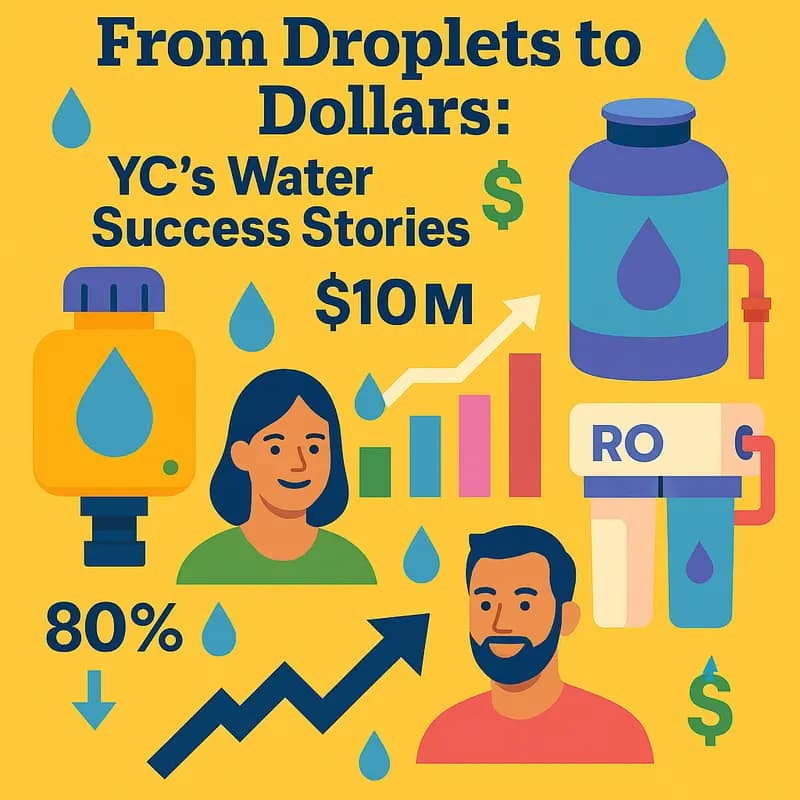
Y Combinator’s water portfolio showcases how cutting-edge innovation paired with Silicon Valley’s growth mindset can transform water challenges into scalable businesses. Several YC-backed water startups have achieved remarkable milestones in both impact and financial returns.
At the forefront are companies revolutionizing water quality monitoring through advanced sensing and analytics. One standout raised $18 million to deploy AI-powered water testing systems across major utilities, achieving 99.9% accuracy while cutting testing time from days to minutes. Their technology now safeguards drinking water for over 15 million people.
In the water reuse space, a YC alumnus developed breakthrough filtration technology that reduces energy consumption by 90% compared to conventional systems. After successful pilots with Fortune 500 manufacturers, they secured $25 million in Series B funding and are scaling rapidly across industrial applications.
Drought resilience solutions have also emerged as a key focus. A notable startup pioneered atmospheric water harvesting technology that generates clean drinking water from air using only renewable energy. They’ve deployed systems in water-stressed communities across three continents, producing over 50 million liters annually at one-third the cost of bottled water.
Beyond individual successes, YC’s water companies demonstrate powerful network effects. Many collaborate on pilot projects, share technical insights, and even develop integrated solutions. This collaborative ecosystem has accelerated commercialization timelines and helped startups navigate the complex water sector.
Crucially, these companies are achieving positive unit economics while delivering environmental impact. Their average gross margins exceed 70%, proving that water technology can be both sustainable and profitable. Several have secured long-term contracts with major utilities and industrial customers, providing stable revenue streams for continued innovation.
The success metrics extend beyond financial returns. Collectively, YC’s water portfolio companies have helped conserve over 100 billion gallons of water, eliminated millions of tons of wastewater discharge, and provided clean water access to underserved communities worldwide.
The Silicon Valley Blueprint for Water Innovation
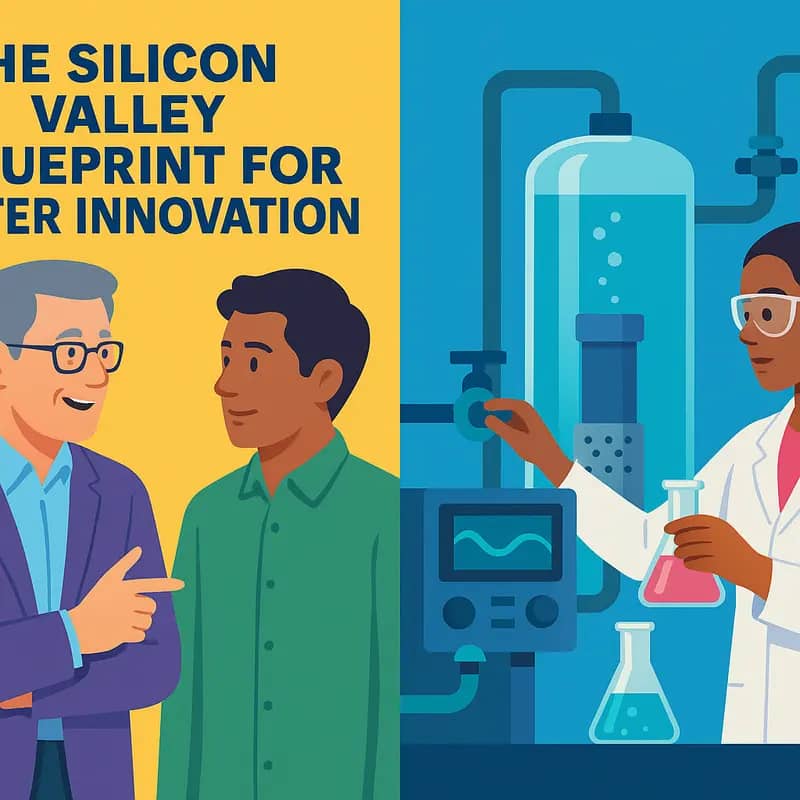
Y Combinator’s approach to accelerating water startups represents a paradigm shift in how the sector approaches innovation. The accelerator’s secret sauce lies in its ability to blend Silicon Valley’s rapid iteration mindset with water industry expertise.
At the core of YC’s model is an intensive mentorship program that pairs water entrepreneurs with both tech veterans and water industry experts. This dual mentorship ensures founders develop viable technical solutions while building scalable business models. The program’s emphasis on rapid prototyping and customer validation helps startups avoid the common pitfall of spending years in R&D without market feedback.
What truly sets YC apart is its unparalleled network effect. Water startups gain instant access to a powerful ecosystem of alumni founders, industry partners, and investors. This network provides critical pathways for pilot projects, commercial partnerships, and follow-on funding. As discussed in How to Build the World Leading Water Innovation Accelerator, such connections are often the difference between success and failure in the water sector.
The technical resources YC provides are equally transformative. Startups receive cloud computing credits, access to specialized testing facilities, and connections to manufacturing partners. This infrastructure allows founders to focus on innovation rather than operational logistics. YC’s emphasis on software and data analytics tools helps startups build more intelligent and connected water solutions.
Perhaps most importantly, YC brings a fresh perspective to water innovation. Rather than accepting the industry’s traditionally slow pace of change, the accelerator pushes founders to think bigger and move faster. This mindset shift, combined with YC’s proven startup methodology, is helping create a new generation of water companies that can scale rapidly while delivering meaningful environmental impact.
The accelerator’s batch approach also creates powerful peer learning opportunities. Water startups learn from companies in adjacent sectors like climate tech and biotech, leading to novel cross-pollination of ideas and approaches. This exposure to different business models and technologies often catalyzes breakthrough innovations.
Impact Metrics: Where Profit Meets Purpose
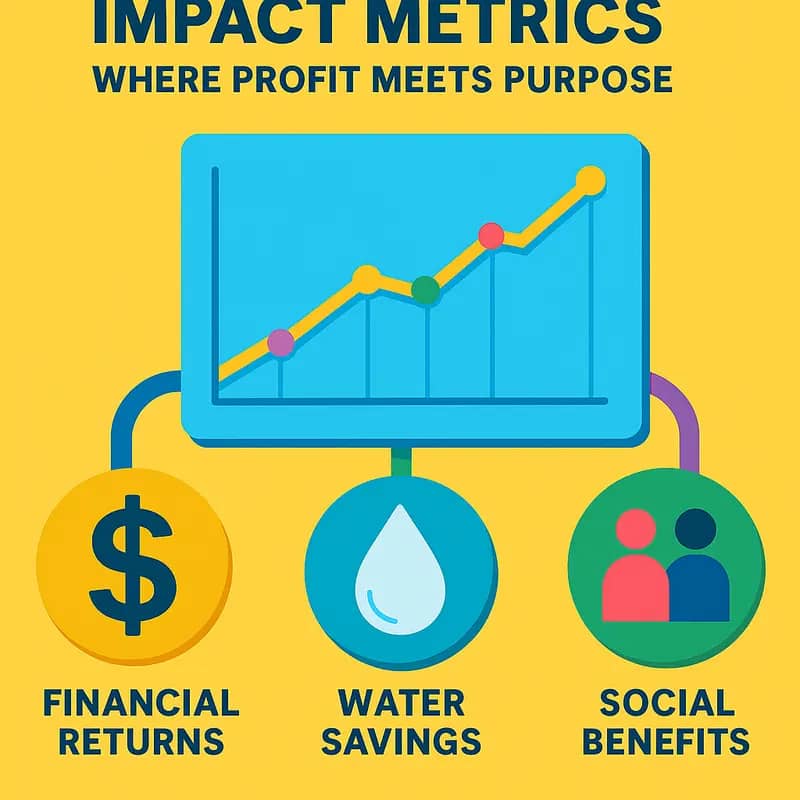
For YC’s water technology portfolio companies, financial success and environmental impact form a deliberate symbiosis rather than competing priorities. The accelerator has pioneered frameworks that treat measurable sustainability outcomes as core business metrics, not mere externalities.
At the heart of this approach lies a sophisticated impact measurement system that tracks both environmental and financial key performance indicators (KPIs). Water startups must demonstrate progress across metrics like gallons of water saved, energy efficiency gains, and contaminant removal rates – alongside traditional growth metrics. This dual-lens evaluation helps align investor expectations with sustainability goals from day one.
The model has proven particularly effective at attracting mission-driven capital. As explored in how to mitigate 4 shades of water risk through impact investing, YC water companies often secure funding from both traditional VCs and impact investors by showing how environmental benefits directly drive business value.
Startups achieve this alignment through innovative business models that monetize positive externalities. Some companies structure water savings as recurring revenue streams through performance contracts. Others create new markets for recovered resources from wastewater treatment. The common thread is translating sustainability metrics into tangible financial returns.
Beyond individual company metrics, YC evaluates portfolio-wide impact through an ecosystem lens. The accelerator tracks how its startups collectively advance water security, climate resilience, and access to safe water. This broader view helps identify patterns of success and opportunities for startups to collaborate toward shared impact goals.
The framework’s success has influenced how the wider water technology sector approaches impact measurement. More investors now expect robust sustainability metrics, while startups increasingly build impact tracking into their operations from the beginning. YC’s model demonstrates that with the right metrics and incentives, profitability and positive impact can be mutually reinforcing rather than zero-sum tradeoffs.
The YC Effect on Water Innovation Ecosystems
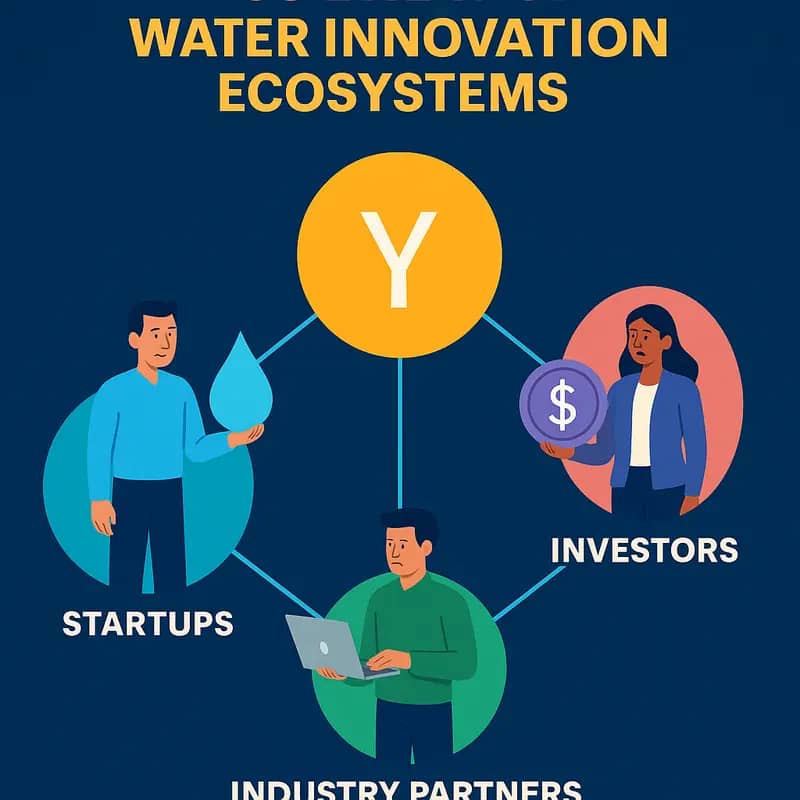
Y Combinator’s entrance into water technology investing has fundamentally reshaped how innovation flows through the sector. By applying their proven accelerator model to water startups, YC has catalyzed a network effect that extends far beyond their portfolio companies.
The accelerator’s presence has sparked a notable shift in early-stage funding dynamics. Traditional water sector investors now regularly co-invest alongside YC, bringing deep domain expertise while adopting more startup-friendly investment terms and faster decision-making processes. This hybridization of investment approaches has created a more robust funding ecosystem that better serves water entrepreneurs.
Equally significant is YC’s influence on industry partnerships. Their portfolio companies consistently secure pilot projects and commercial deals with major utilities and corporations at unprecedented speed. This acceleration of technology adoption cycles stems from YC’s emphasis on rapid iteration and close customer development – practices that have begun permeating the broader water sector’s approach to innovation.
The accelerator has also catalyzed new models of collaboration. Water startups increasingly form technical partnerships with each other, sharing data and insights in ways previously rare in this traditionally guarded industry. Meanwhile, established players have launched their own innovation initiatives that mirror aspects of YC’s approach, from corporate accelerators to open innovation challenges.
Yet perhaps YC’s most profound impact has been cultural. Their entry helped legitimize water technology as a serious venture investment category, attracting new capital and talent to the sector. The accelerator’s ethos of ambitious thinking has pushed founders to tackle fundamental technical challenges rather than incremental improvements, raising the bar for innovation across the ecosystem.
As explored in Is Entrepreneurship the Missing Link to Shape the Future of the Water Industry?, this entrepreneurial mindset shift may be what the water sector needed most. While maintaining rigorous technical standards, YC has helped dismantle artificial barriers between the startup and traditional water worlds, creating new pathways for breakthrough solutions to reach global scale.
Future Flows: YC’s Vision for Water Technology

Y Combinator’s water technology thesis centers on breakthrough innovations that can scale exponentially while maintaining capital efficiency. Their investment strategy prioritizes solutions that leverage artificial intelligence, advanced materials, and biotechnology to address critical water challenges.
At the core of YC’s vision lies the belief that software and data analytics will fundamentally transform water infrastructure management. They’re particularly focused on startups developing predictive maintenance systems, automated treatment controls, and real-time water quality monitoring platforms that can reduce operational costs while improving service reliability.
Emerging materials science is another key focus area, with YC tracking innovations in membrane technology, advanced filtration, and novel treatment processes. They see tremendous potential in biomimetic materials that can selectively remove contaminants while minimizing energy usage. The accelerator is especially interested in solutions targeting emerging contaminants like PFAS and microplastics.
Beyond individual technologies, YC envisions a future where distributed, modular water systems complement centralized infrastructure. This hybrid approach could improve resilience while enabling more efficient resource allocation through smart networks and real-time optimization.
What sets YC’s investment thesis apart is their emphasis on business model innovation alongside technical breakthroughs. They’re backing founders who can transform traditional water utility models through innovative approaches to water economics and financing. This includes water-as-a-service models, performance-based contracting, and novel risk-sharing mechanisms.
Looking ahead, YC sees increasing convergence between water technology and other sectors like energy, agriculture, and advanced manufacturing. They’re positioning their portfolio companies to capitalize on these intersections while maintaining laser focus on solving fundamental water challenges. Their vision suggests that the next wave of water innovation will be led by companies that can seamlessly integrate multiple technologies while demonstrating clear paths to rapid scale and profitability.
YC’s Water Tech Evolution
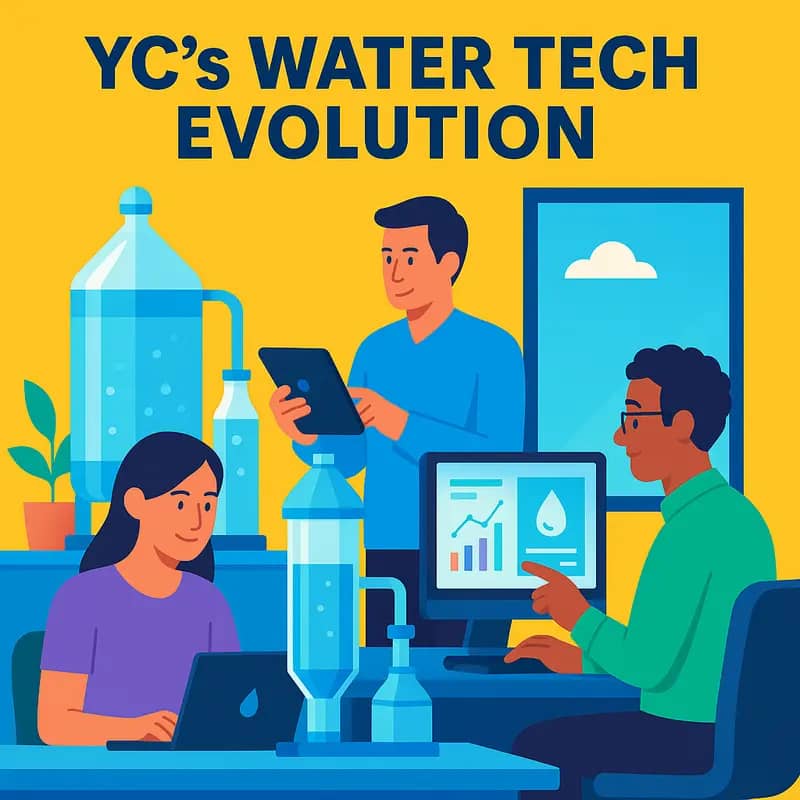
Y Combinator’s journey into water technology marks a defining shift in how Silicon Valley approaches global water challenges. The accelerator’s portfolio increasingly reflects a strategic focus on breakthrough water innovations that combine scalable impact with venture-scale returns.
Y Combinator’s water technology thesis centers on identifying founders who leverage software, advanced materials, and biotechnology to solve critical water challenges. The accelerator particularly favors solutions that can scale rapidly while maintaining capital efficiency – a deliberate departure from traditional infrastructure-heavy water projects.
This evolution stems from YC’s recognition that water technology represents a massive yet underserved market opportunity. Global water and wastewater treatment markets exceed $250 billion annually, with severe supply-demand imbalances creating urgent needs for innovation. The accelerator’s water startups focus on high-impact areas including advanced filtration, real-time monitoring, resource recovery, and decentralized treatment systems.
YC’s approach has catalyzed a new wave of water entrepreneurship by applying its proven methodology to water innovation. The accelerator’s water startups benefit from YC’s emphasis on rapid iteration, customer development, and scalable business models. This has helped water founders move beyond traditional industry constraints and create solutions that can achieve both meaningful impact and strong financial returns.
Notably, YC’s influence extends beyond individual companies to reshape broader water innovation dynamics. The accelerator’s involvement signals to other investors that water technology can deliver venture-scale returns, helping unlock additional capital for the sector. YC water founders are also building a collaborative ecosystem, sharing learnings and resources to accelerate collective progress.
As water challenges intensify globally, YC’s growing focus on water technology represents a crucial bridge between Silicon Valley innovation approaches and pressing environmental needs. The accelerator’s unique ability to identify, nurture, and scale breakthrough water solutions positions it as a key catalyst in addressing 21st-century water security.
The YC Advantage for Water Startups
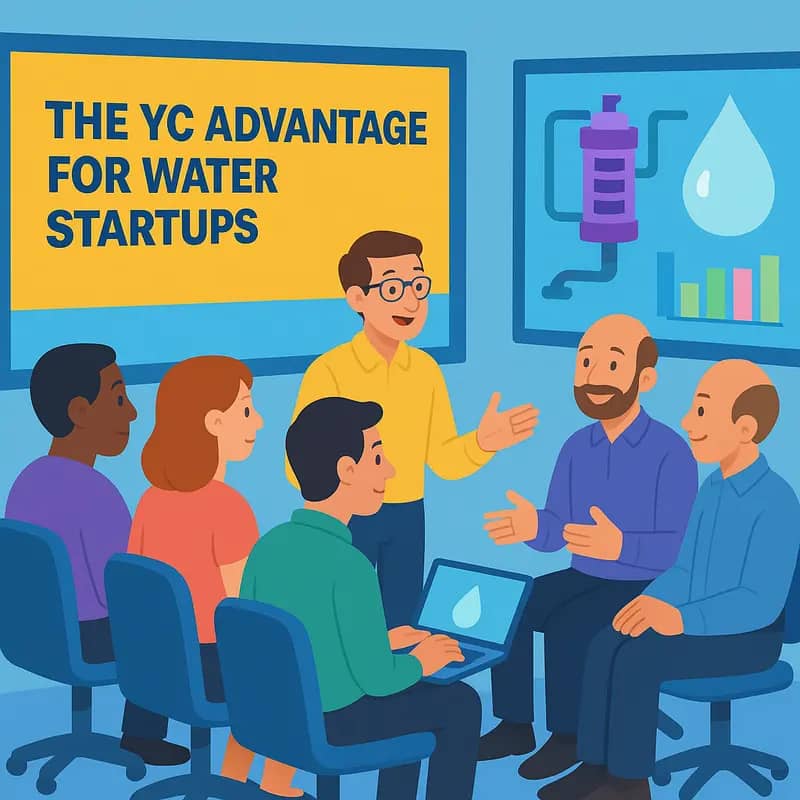
Y Combinator’s approach to nurturing water technology startups represents a paradigm shift in how these ventures access resources and scale their innovations. The accelerator’s unique advantage stems from its proven ability to combine substantial initial funding with an unparalleled support ecosystem.
The funding structure sets YC apart by providing water startups with standardized terms – typically $500,000 for 7% equity. This arrangement delivers immediate working capital while preserving founder ownership, enabling teams to focus on technology development rather than continuous fundraising. More importantly, YC’s investment serves as a powerful signal to other investors, often catalyzing follow-on funding rounds.
Beyond capital, YC’s mentorship model creates transformative value. Weekly office hours with experienced founders and industry experts help water startups navigate complex regulatory environments, pilot project requirements, and enterprise sales cycles. This hands-on guidance accelerates learning and helps avoid common pitfalls unique to the water sector.
The accelerator’s networking effect proves particularly potent for water technology ventures. Batch mates become natural collaborators, creating opportunities for technology integration and market expansion. Alumni connections open doors to strategic partnerships, while YC’s reputation facilitates engagement with utilities, municipalities, and industrial customers – traditionally conservative buyers who might otherwise hesitate to work with startups.
Perhaps most valuably, YC instills a growth mindset that challenges conventional water industry thinking. The accelerator pushes founders to think bigger about market opportunities while maintaining focused execution. This balance helps water startups avoid the trap of building impressive technology that lacks clear commercial application.
As discussed in how to admit value and actually overcome the economic risk of water, the ability to demonstrate both environmental impact and financial returns is crucial. YC’s framework helps startups achieve this balance, preparing them to engage successfully with both impact-focused and traditional investors.
Impact Investment Synergies
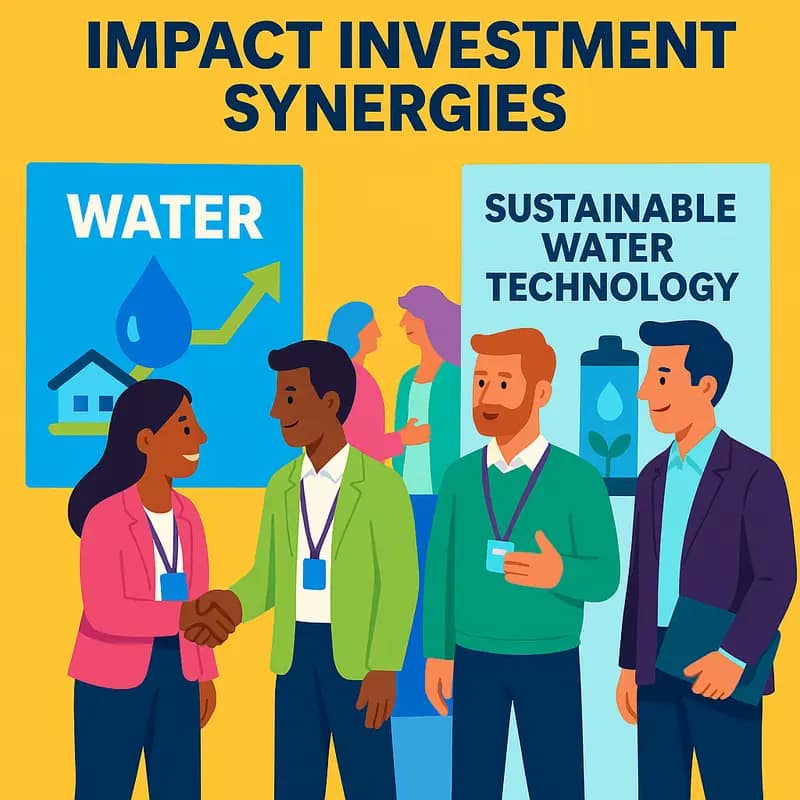
Y Combinator’s approach to connecting water startups with impact investors represents a masterclass in strategic matchmaking and ecosystem building. By leveraging its extensive network and deep understanding of both sides of the investment equation, YC creates powerful synergies that accelerate water innovation deployment.
The accelerator’s impact investment strategy centers on three core pillars. First, YC maintains close relationships with mission-driven funds and family offices focused on water sustainability. This enables rapid introductions when promising water technologies emerge from its program. Second, YC helps startups structure their value propositions to highlight both financial returns and measurable environmental impact – a crucial balance for impact investors. Third, the accelerator acts as a trusted filter, conducting rigorous due diligence that gives investors confidence in the technical and commercial viability of water solutions.
Beyond direct investment connections, YC plays a vital role in fostering meaningful partnerships across the water sector. The accelerator regularly convenes water utilities, engineering firms, and corporate partners alongside impact investors. These curated interactions help startups build robust pilot programs and commercial partnerships that de-risk investments.
YC’s impact approach also emphasizes patient capital alignment. The accelerator guides water startups toward investors who understand the longer development and adoption cycles common in water technology. This prevents mismatched expectations and builds sustainable funding relationships that can support startups through multiple rounds.
Critically, YC leverages its brand equity to amplify water startup visibility among impact investors. The accelerator’s stamp of approval serves as powerful social proof, helping water entrepreneurs stand out in a crowded funding landscape. By combining this credibility with structured support in areas like pitch refinement and impact measurement, YC maximizes startups’ chances of securing mission-aligned capital.
Technical Innovation Framework

Y Combinator’s approach to water technology evaluation follows a rigorous yet adaptable framework that has redefined how water innovations move from concept to market. At its core lies a deep technical due diligence process examining both the fundamental science and practical engineering of proposed solutions.
The accelerator employs a three-phase evaluation methodology centered on technical feasibility, scalability potential, and market readiness. Initial screening focuses on validating core technology claims through independent expert review and benchmarking against existing solutions. This includes examining parameters like energy efficiency, removal rates, and operational stability under varying conditions.
Y Combinator has developed specialized metrics to assess water technology readiness levels while accounting for the sector’s unique challenges. Rather than applying a one-size-fits-all approach, the framework considers factors like regulatory compliance pathways, pilot testing requirements, and integration with existing infrastructure.
The technical nurturing process leverages YC’s vast network of water industry veterans, research institutions, and testing facilities. Startups receive structured guidance on experimental design, data collection protocols, and validation methodologies aligned with real-world deployment scenarios. This hands-on support helps bridge the notorious “valley of death” between promising lab results and commercially viable solutions.
Notably, the framework emphasizes rapid iteration and continuous refinement based on market feedback. Startups are encouraged to maintain close dialogue with potential customers throughout development, ensuring technical capabilities align with actual pain points. This market-driven approach helps avoid the common pitfall of pursuing technically elegant solutions that lack practical application.
As explored in the secrets of innovation culture, the framework’s success stems from finding the right balance between technical rigor and entrepreneurial agility. By establishing clear technical milestones while remaining flexible on implementation paths, YC helps water startups optimize their development trajectory for both innovation impact and commercial success.
Global Water Impact
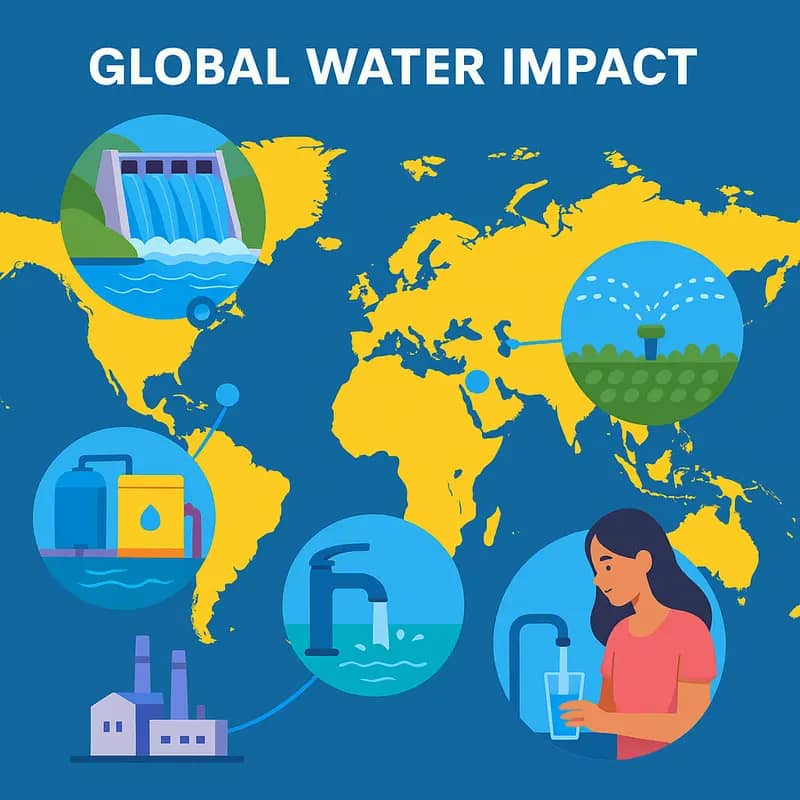
Y Combinator’s water technology portfolio is driving meaningful change across diverse geographies and water challenges. From innovative desalination approaches in water-scarce regions to advanced wastewater treatment solutions in developing economies, YC-backed companies are delivering tangible impact at scale.
In arid regions like the Middle East and North Africa, YC startups have deployed breakthrough membrane technologies that reduce energy consumption in desalination by up to 65% compared to conventional systems. These advancements make clean water production more sustainable and economically viable for millions of people.
Across South Asia, YC companies have pioneered decentralized water treatment systems that serve over 500 communities previously lacking reliable access to safe drinking water. By combining robust purification technology with pay-as-you-go business models, these solutions overcome both technical and financial barriers to clean water access.
In urban centers worldwide, YC-backed water monitoring and analytics platforms help utilities prevent over 2 billion gallons of water loss annually through smart leak detection and predictive maintenance. This technology not only conserves precious water resources but also helps utilities maintain financial sustainability.
The accelerator’s impact extends into industrial applications, where its portfolio companies enable manufacturing facilities to recycle up to 95% of their process water. This dramatic reduction in freshwater consumption has proven particularly valuable in water-stressed industrial regions.
Perhaps most importantly, YC water startups have demonstrated that building sustainable businesses and delivering social impact are not mutually exclusive goals. Their success in raising capital and scaling operations while maintaining focus on positive environmental and social outcomes provides a blueprint for future water entrepreneurs.
Through strategic deployment of transformative technologies and innovative business models, YC’s water portfolio is helping reshape how the world manages its most precious resource. As these companies continue to scale, their collective impact on global water challenges grows exponentially.
Future Opportunities
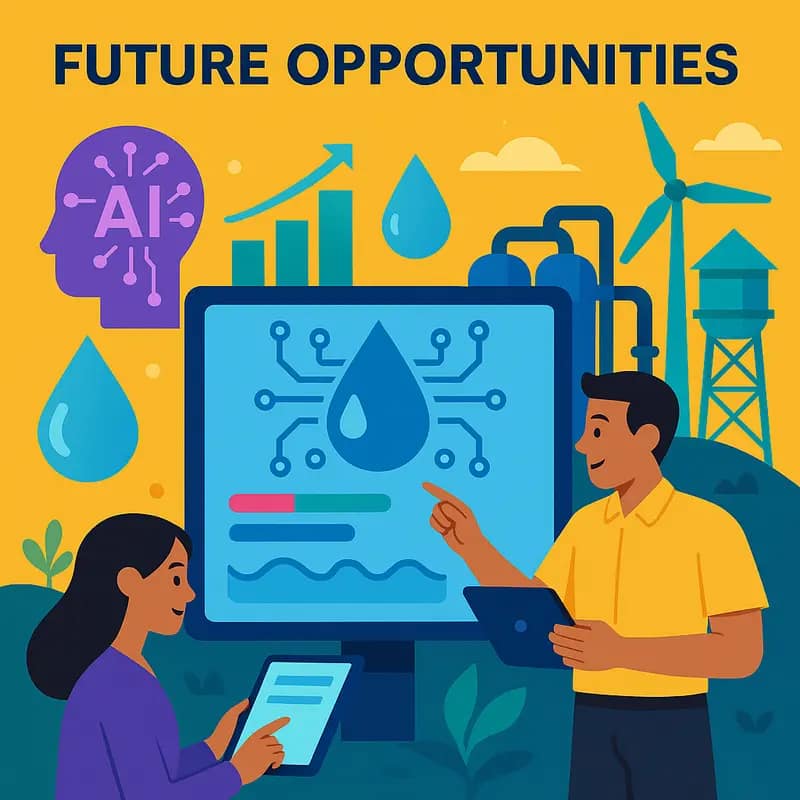
The convergence of water technology and Y Combinator’s startup methodology is unlocking unprecedented opportunities for entrepreneurs and investors alike. A clear pattern emerges as water innovation shifts from traditional infrastructure plays to data-driven, scalable solutions.
Y Combinator’s portfolio increasingly reflects a focus on decentralized water treatment systems, AI-powered analytics, and circular economy solutions. This evolution aligns with the accelerator’s preference for software-enabled business models that can scale rapidly while maintaining capital efficiency.
Perhaps the most compelling opportunity lies in the intersection of climate resilience and water technology. As climate change intensifies water stress globally, YC-backed startups focusing on water reuse, precision irrigation, and drought management are positioning themselves for explosive growth. These ventures leverage AI and IoT capabilities to deliver water savings while building recurring revenue streams.
The rise of water-focused impact investing presents another significant opportunity. YC’s track record of nurturing successful water startups has caught the attention of environmental, social, and governance (ESG) investors seeking both financial returns and measurable impact. This growing investor interest is creating a virtuous cycle, attracting more ambitious water entrepreneurs to the accelerator.
Emerging trends in materials science and biotechnology are opening new frontiers for water innovation. Advanced membrane technologies, biomimetic solutions, and novel water treatment processes are becoming increasingly viable as commercialization pathways mature.
For investors, the water sector’s fragmentation presents unique opportunities for value creation through consolidation and digital transformation. YC’s emphasis on founder development and go-to-market strategy positions its water startups to capitalize on these industry dynamics.
The next wave of water innovation will likely focus on integrated solutions that address multiple challenges simultaneously – from water quality and scarcity to energy efficiency and resource recovery. Y Combinator’s proven ability to identify and accelerate transformative technologies makes it a crucial catalyst in this evolution.
Final words
Y Combinator’s impact on water technology innovation extends far beyond its portfolio companies. By applying Silicon Valley’s high-growth mindset to water challenges, YC has helped prove that environmental impact and venture returns aren’t mutually exclusive. Their success in nurturing water startups has created a ripple effect, inspiring other accelerators and investors to take water technology seriously. For water entrepreneurs, YC’s playbook offers valuable lessons in scaling impact: focus on clear metrics, leverage technology for efficiency, and build solutions that respond to market demands while addressing critical environmental challenges. For impact investors, YC’s water portfolio demonstrates how patient capital combined with intensive support can help breakthrough technologies reach commercial scale. As water challenges intensify globally, YC’s model of fostering innovation while maintaining high standards for both impact and returns becomes increasingly relevant. The next wave of water entrepreneurs will build on this foundation, armed with YC’s proven frameworks for turning water challenges into opportunities. The future of water technology looks promising, thanks in no small part to YC’s pioneering work in bridging the gap between Silicon Valley innovation and environmental impact.
Wanna explore the Full List of Water Investors that cut at least two checks over the past decade? Check it out and bookmark it, I update it regularly!
Learn more: https://dww.show/the-ultimate-water-investor-database/
About us
Through my “(don’t) Waste Water” platform, I offer unique and insightful coverage of the water industry that combines technical expertise with engaging storytelling. If you haven’t yet, it might be time for you to subscribe to the podcast, the youtube channel and/or the newsletter!
